|
|
|
Sort Order |
|
|
|
Items / Page
|
|
|
|
|
|
|
| Srl | Item |
| 1 |
ID:
153878
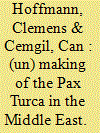

|
|
|
|
|
| Summary/Abstract |
Turkey’s foreign policy activism has received mixed reviews. Some feel threatened by the alleged increasing Islamization of the country’s foreign policy, sometimes called ‘neo-Ottomanism’, which is seen as a significant revision of Turkey’s traditional transatlanticism. Others see Turkey as a stable democratic role model in a troubled region. This debate on Turkish foreign policy (TFP) remains dominated by a sense of confusion about what appear to be stark contradictions that are difficult to make sense of. Intervening in this debate, this article will develop an alternative perspective to existing accounts of Turkey’s new foreign policy. Offering a historical sociological approach to foreign policy analysis, it locates recent transformations in Turkey’s broader strategies of social reproduction. It subsequently argues that, contrary to claims about Turkey’s ‘axis shift‘, its changing foreign policies have in fact never been pro-Western or pro-American. All foreign policy ‘shifts’ and ‘inconsistencies’, we argue, are explicable in terms of historically changing strategies of social reproduction of the Ottoman and Turkish states responding to changing domestic and international conditions.
|
|
|
|
|
|
|
|
|
|
|
|
|
|
|
|
| 2 |
ID:
153891
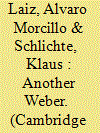

|
|
|
|
|
| Summary/Abstract |
While there has arguably been a partial reception of Weber in international relations (IR), we argue here that his ideas have either been misunderstood or neglected. In order to highlight the most valuable Weberian insights, we focus on two topics of crucial importance to IR. First, in our view, Weber's crucial contribution to the study of states is not his alleged emphasis on the monopoly of violence but his concern with the problem of legitimacy, which is the key to understanding why individuals actually orient an action according to their beliefs in the idea of a state. Second, Weber conducted seminal historical investigations on religion, the rationalization of economic ethics, and organizations that show that the diffusion of isomorphism has little to do with supposedly uninterested and persuasive scientific and professional associations. Instead, more attention should be paid to rational domination and less to reified concepts such as John Meyer's ‘rationalized otherhood’. These arguments are also examined empirically.
|
|
|
|
|
|
|
|
|
|
|
|
|
|
|
|
| 3 |
ID:
153907
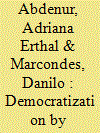

|
|
|
|
|
| Summary/Abstract |
The field of international development has undergone major shifts as South–South cooperation expands. New questions are being raised about the political implications of this cooperation, including with respect to democracy and human rights. In this paper, we analyse the role of Brazil, a democratic provider of South–South cooperation, in fomenting these principles in Africa. We find that explicit democracy promotion makes up a minority of Brazil’s cooperation with Africa. However, Brazil also engages in social policy initiatives which, despite not being labelled as democracy and human rights promotion, are inspired by Brazil’s own experiences with re-democratization—what we refer to as “democratization by association”. We argue that these initiatives—mostly geared towards institution-building in areas where Brazil seeks to promote itself as a hotbed of policy innovation—are disembedded from the political context in which they arose in Brazil. While this disembeddedness allows the Brazilian state to maintain its official discourse of non-interference, it also makes the political impact of Brazilian cooperation in Africa highly uncertain.
|
|
|
|
|
|
|
|
|
|
|
|
|
|
|
|
| 4 |
ID:
153904
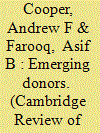

|
|
|
|
|
| Summary/Abstract |
This paper examines the evolving pattern of democracy promotion by three emerging donors: India, Brazil and South Africa. It first asks how the emerging donors promote democracy through their development assistance. The paper argues that despite the risk of compromising security and trade interests, the emerging donors have adapted to a 2 × 2 (two by two) model of democracy promotion by which they circumvent risk by promoting procedural democracy through bilateral means and non-procedural democracy through multilateral frameworks. Second, the paper asks why these three countries exhibit the same pattern of democracy promotion in spite of not having coordination among them. In response, the paper provides a structure–agent explanation. The paper contends that the structural constraints imposed on emerging donors are conducive to the operation of the 2 × 2 model in promoting democracy. While the model safeguards the emerging donors from criticism of being undue interveners in other countries' domestic affairs, it also privileges them with international recognition for being responsible partners in democracy promotion.
|
|
|
|
|
|
|
|
|
|
|
|
|
|
|
|
| 5 |
ID:
153910
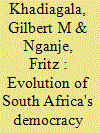

|
|
|
|
|
| Summary/Abstract |
South Africa is an emerging power with fairly strong democratic institutions that were crafted during the transition from minority to majority rule twenty years ago. How has South Africa used its position and power to promote democracy in Africa? Against the backdrop of debates on democracy promotion by emerging powers, this article probes attempts by successive post-apartheid governments to promote democracy in Africa. We argue that although democracy promotion featured prominently in South Africa's policy towards Africa in the immediate post-apartheid period under Nelson Mandela, the administrations of Thabo Mbeki and Jacob Zuma faltered in advancing democratic norms. This is largely because South Africa has confronted pressures to maximize pragmatic national interests, which have compromised a democratic ethos in a continental environment where these values have yet to find steady footing.
|
|
|
|
|
|
|
|
|
|
|
|
|
|
|
|
| 6 |
ID:
153880
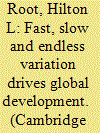

|
|
|
|
|
| Summary/Abstract |
This article explores the dynamics of institutional adaptation in fast-growing, highly interconnected polities in the developing world, and challenges the thesis in modernization theory which posits that economic growth and thus higher per-capita income lead over time to democracy. One mechanism often proposed to explain this link is the idea that economic growth and higher per capita income in a society lead individual citizens in that society to become more receptive to democratic values and norms, and that this receptivity can pave the way for the birth of democracy. Yet evidence increasingly demonstrates that the link is at best tenuous and often not empirically valid. Why have many fast-growing economies and modernizing societies not made a transition to democracy, as predicted by modernization theory? This paper addresses this question, with ideas from complex adaptive systems and evolutionary social psychology, as well as case analyses of Turkey and China.
|
|
|
|
|
|
|
|
|
|
|
|
|
|
|
|
| 7 |
ID:
153883
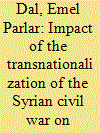

|
|
|
|
|
| Summary/Abstract |
This article examines how Turkey was affected by the conflict spillover effects of the Syrian civil war and its escalation in the last two years with the rise of the Islamic State in Iraq and Syria (ISIS) threat and the changing nature of the Kurdish insurgency. It seeks to assess the degree of the transnationalization of the Syrian civil war and its spread to Turkey by employing a theoretical framework borrowed from the conflict clustering literature. The first part will introduce the dual-embedded theoretical framework with its division of conflict spillover effects as “intentional” and “unintentional”. The second part tries to apply this dual-track framework to the Turkish case and, thus, seeks to test the conflict spillover factors on Turkey. The third part focuses on the two specific and major spillovers of the Syrian civil war, the ISIS threat and the rise of an embedded Kurdish insurgency, namely Democratic Union Party (PYD or Partiya Yekîtiya Demokrat)-Peoples Protection Units (Yekîneyên Parastina Gel or YPG)/Kurdistan Workers Party (Partiya Karkerên Kurdistanê or PKK), and explains the conflict spillover processes of these two case studies under a triple framework, origin, diffusion and escalation and with reference to the division between intentional and unintentional spillover effects.
|
|
|
|
|
|
|
|
|
|
|
|
|
|
|
|
| 8 |
ID:
153890


|
|
|
| 9 |
ID:
153882
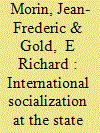

|
|
|
|
|
| Summary/Abstract |
This article synthesizes the results of two quantitative analyses, one at a macro and the second at a micro level, to shed light on the process of international socialization. The first analysis examines the seeming adoption of intellectual property norms at the state level while the second looks at the internalization of similar norms at the individual decision maker level. Both pay special attention to foreign education and capacity-building courses as carriers of US norms to developing countries. By triangulating the results of these analyses, we develop a more nuanced view of international socialization processes than analyses centred at only one level. We provide clear evidence that institutionalization of foreign norms often takes place prior to individual persuasion rather than as a result of it. We show that different socialization types (acculturation and persuasion) and the transmission of different idea types (causal and normative beliefs) may simultaneously operate in opposing directions. These conclusions reveal a bias in previous studies that focussed at only one level of analysis and support calls for greater eclecticism in the levels of analysis.
|
|
|
|
|
|
|
|
|
|
|
|
|
|
|
|
| 10 |
ID:
153902
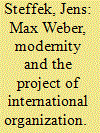

|
|
|
|
|
| Summary/Abstract |
In this essay I discuss programmatic proposals for international organization in the light of Max Weber's account of modernity. I argue that the authors known in international relations (IR) as ‘functionalists’ have pursued the extension of the modernization process that Weber analysed in national societies into the international sphere. Between 1900 and 1945, functionalists advocated a transformation of international politics, at that time still the domain of a lot of jingoism and aggression, into rational public administration. In the first part of the article I outline Weber's account of societal modernization with a focus on the sharp contrast between politics and bureaucratic administration. In the second section I engage with the writings of three political scientists who represent the early ‘functionalist’ tradition in IR: Paul Reinsch, James Arthur Salter and David Mitrany. I show how they planned to modernize IR by establishing a technocratic mode of governance and hence a Versachlichung der Gewaltherrschaft, that is, a depersonalization and rationalization of authority. The turn to international organizations in the early twentieth century thus can be seen in the context of the universal process of societal modernization as rationalization that Weber analysed.
|
|
|
|
|
|
|
|
|
|
|
|
|
|
|
|
| 11 |
ID:
153920
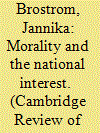

|
|
|
|
|
| Summary/Abstract |
This article engages with recent scholarship on role of morality in classical realist conceptions of the national interest. It argues that for analytical purposes morality can be linked to notions of power, rather than being explicitly or solely normative. This stems from a re-examination of conversations between classical realists about absoluteness, where morality is treated as a categorical imperative; and about consequences, or the understanding that policy can have both moral and material outcomes. I then conduct a focused analysis of three common strands in the work of Morgenthau, Niebuhr and Kennan that facilitate the development of what might be termed a ‘moral realist’ framework. In doing so, I address the expectations, modes and results of foreign policy choices. This incorporates expectations of reciprocity in state relations, the importance of rational choice and the outcomes of ‘moral’ foreign policy choices. I conclude that moral realism shows some promise as an evaluative tool, and is worthy of further development.
|
|
|
|
|
|
|
|
|
|
|
|
|
|
|
|
| 12 |
ID:
153886
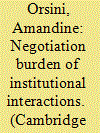

|
|
|
|
|
| Summary/Abstract |
The participation of non-state actors in international politics has been investigated since the creation of international institutions. Yet, the rules, principles and norms of global governance are no longer discussed in single isolated institutions. Rather, with the proliferation of international regimes and organizations, international issues are now negotiated in a context of institutional interactions known as ‘regime complexes’. This poses new questions, in particular on the negotiation burden that these new processes place on international actors. To answer this question, this contribution compares non-state participation in both contexts (single regimes and regime complexes), using the international forest negotiations as a case study. It uses quantitative methods to measure the negotiation burden of single regimes and compare it with the negotiation burden of regime complexes. The negotiation burden of single regimes is found to be insignificant, political interest being the major motivation for participation, while the negotiation burden of regime complexes is found to be real, demanding a certain type of material and organizational resources in order for non-state actors to participate. Yet a certain diversity of non-state representation is maintained within regime complexes, non-governmental organizations being dominant with respect to business groups.
|
|
|
|
|
|
|
|
|
|
|
|
|
|
|
|
| 13 |
ID:
153917
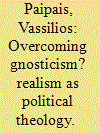

|
|
|
|
|
| Summary/Abstract |
This paper takes issue with approaches that relate realist political theology exclusively back to its Schmittian and neo-orthodox roots. While not entirely denying those influences, it argues that realist thought is more accurately described as rooted in the tensions characterizing Augustine's anti-heretic diatribes rather than taking inspiration from Schmittian political theology or the ‘Gnostic’ tendencies in Protestant neo-orthodox theology. Augustine's refutation of both the Manichaean Gnostic and the Pelagian solutions to the problem of evil gave rise to a complex understanding of the relationship between human free will and original sin based on a combination of ontological monism and ethical dualism. Building on this heritage, realists can be read as rehearsing Augustine's ambiguous gesture of overcoming Gnosticism with equally uncertain success. In responding to the modern ‘Gnostic’ challenge in terms that recognized the dialectical tension between ontological monism and ethical dualism, realists such as Morgenthau and Niebuhr should rather be seen as direct heirs of Augustine's ambivalent orthodoxy rather than Schmitt's unorthodox, semi-‘Gnostic’ Catholicism. This intellectual legacy may, then, explain their abhorrence of purist positions in politics—be they quietism, pacifism or, their opposite, political messianism—and adherence to an anti-‘Gnostic’ pragmatism grounded in the tensions of Augustinian theology.
|
|
|
|
|
|
|
|
|
|
|
|
|
|
|
|
| 14 |
ID:
153881
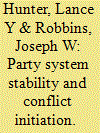

|
|
|
|
|
| Summary/Abstract |
The study of interstate conflict has yielded a voluminous literature to date, yet much of the recent work has only just begun to underscore the importance of domestic factors in predicting conflict initiation in democracies. In short, some of these studies find that when electoral accountability is greater—measured in a variety of ways—interstate conflict becomes less likely. Despite this burgeoning literature, scholars have spent far less time analysing the role linkage institutions, such as stable party systems, have played in foreign policy discussions. To address this gap, we argue that in more stable party systems conflict initiation becomes less likely due to the greater accountability present in these systems. This conjecture is supported by the results of a time-series cross-sectional analysis of 48 democracies from 1978 to 2000 that uses multiple measures of conflict initiation and party system stability.
|
|
|
|
|
|
|
|
|
|
|
|
|
|
|
|
| 15 |
ID:
153913
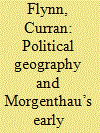

|
|
|
|
|
| Summary/Abstract |
The article is concerned with inconsistencies in Politics among nations (PAN) and Scientific man versus power politics in relation to statements on geopolitics. The article attempts to place these works in the internal and external context of the period in order to ascertain the reason for the inconsistencies. The analysis begins with the context of the chief academic debates in political geography at the time and proceeds to explain the source of the inconsistency between the two books, using the text and archival materials. Following this, the works and criticisms of Halford Mackinder, James Fairgrieve and Nicholas Spykman are examined. The external contextual elements of the Second World War, the beginning of the Cold War and the awakening of American global power are considered as factors in the shift towards a more favourable view on geographical considerations in international relations in PAN. The conclusion that the article reaches is that there are two factors which explain the inconsistency, the integration of American thought on international relations with Morgenthau’s own ideas and the diverging purpose of the books.
|
|
|
|
|
|
|
|
|
|
|
|
|
|
|
|
| 16 |
ID:
153875
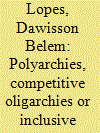

|
|
|
|
|
| Summary/Abstract |
In this article, I assume that global intergovernmental organizations (GIGOs) function as enablers of interstate liberal politics by way of their multilateral institutional frameworks. To support this view, I recall and adapt the classical concept of ‘polyarchy,’ coined in the early 1950s by Robert A. Dahl. It consists of a two‐dimensional theoretical construct applicable for measuring the level of liberalization in modern political societies. It follows that the more actors who take part in politics, and the more such institutions allow political opposition, the more open a society (of states) is likely to be. I therefore assess and rate the level of polyarchization of 23 GIGOs that cover various issue areas and fit some specific criteria (for example, more than one hundred member states from at least three different continents). Methodology includes a scorecard developed to help achieve these research objectives.
|
|
|
|
|
|
|
|
|
|
|
|
|
|
|
|
| 17 |
ID:
153894
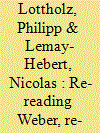

|
|
|
|
|
| Summary/Abstract |
This article analyzes how different interpretations of Max Weber’s work on the state and legitimacy have materialized in contemporary research on—and practice of—international state-building. We argue that the currently prevailing neo-Weberian institutionalism in state-building theory and practice is based on a selective interpretation of the passionate and polemicist ‘politician’ Max Weber, whilst omitting almost entirely the wealth of thought on interpretivist method and the anti-foundationalist approach to social sciences that he has developed in his scholarly work. The neo-Weberian institutionalist approach thus focuses almost exclusively on state capacity and institutions. In contrast to this restricted approach, we will show how Weber’s work on the historical and cultural dimensions of legitimacy is instructive in understanding the emergence and consolidation of social orders. Research agendas embracing such perspectives offer a viable way forward from the securitized approach to state-building and international intervention, in the process moving beyond the neo-Weberian orthodoxy.
|
|
|
|
|
|
|
|
|
|
|
|
|
|
|
|
| 18 |
ID:
153879
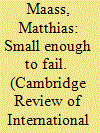

|
|
|
|
|
| Summary/Abstract |
Since the Peace of Westphalia, few great powers have “died”, while the “death rate” and proliferation of small states has been dramatic at times. What causes these fluctuations? In this paper, I claim that the dominant reason for the extinction, emergence and proliferation of the small state over the last three and a half centuries is to be found at the system level. Ultimately, small state survival is determined by the particular set-up of the state system. I advance this argument from the perspective of international relations theory, integrating the relevant scholarship of the English School and realism, especially structural realism. The latter’s systemic perspective provides the basis for arguing that small states are structurally irrelevant. It is this feature of the small state, its irrelevance with regard to the power-based structure of the state system, which has caused the small state to “struggle for existence” in the past, and which has allowed small states to proliferate during the bipolar Cold War.
|
|
|
|
|
|
|
|
|
|
|
|
|
|
|
|
| 19 |
ID:
153899
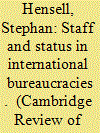

|
|
|
|
|
| Summary/Abstract |
Recent studies in international relations (IR) have devoted little systematic attention to the personnel of international organizations. This article argues that the works of Max Weber could provide an orientation for future research on the cohesion and autonomy of the staff in international bureaucracies. In his writings, Weber highlights the role of bureaucratic officials as an “occupational status group” or Berufsstand distinguished by their professional ethics, privileged positions, practices of social closure and a particular style of life, which is expressed in a claim to social prestige. Weber suggests a sociological analysis of bureaucratic staff, whose group character is determined by their occupation and profession. The article outlines Weber’s understanding of the administrative official by revisiting his seminal sociological and political writings. The added value of Weber’s conception for IR is demonstrated with an empirical sketch of the EU civil service, which can be analysed as a transnational status group in the making.
|
|
|
|
|
|
|
|
|
|
|
|
|
|
|
|
| 20 |
ID:
153874


|
|
|
|
|
| Summary/Abstract |
When the George W Bush administration announced the ‘freedom agenda’ in the Middle East, officials claimed it marked a major break in United States (US) foreign policy. In 2005, the administration intensified efforts pressuring Egypt, a client state, to democratize. However, the US continued pursuing security cooperation with and providing military aid to Egypt. Egyptian President Hosni Mubarak repelled US reform efforts by exploiting the normative inconsistency between democratization and security in the war on terror. This paper reviews Mubarak's ‘balking’ strategy (Stephen Walt, Taming American power, New York: WW Norton, 2005), including feigning compliance through nominal legal changes and counter-arguments to buy time until the inconsistencies in US policy came to a head. By 2006, the US had abandoned the freedom agenda and the Egyptian regime had embarked on a repression campaign. As I argue, the implications of the contradictions in US policy towards Egypt demonstrate that weaker client states may enjoy increased agency vis-à-vis a weakly committed patron hegemon.
|
|
|
|
|
|
|
|
|
|
|
|
|
|
|
|
|
|
|
|
|